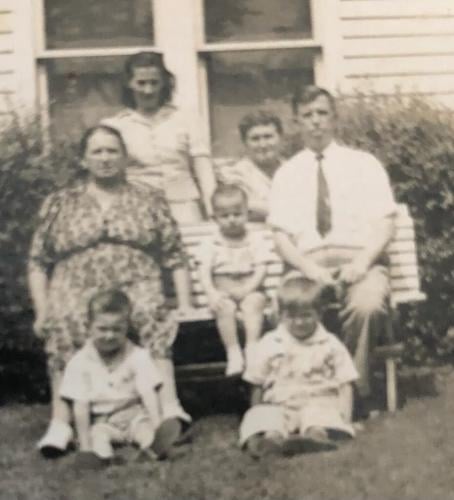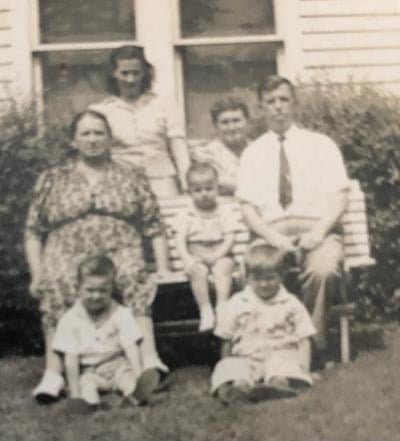The following was shared by John T. Guzalak, of Auburn:
My name is John T. Guzalak; I am 61 years old, born in Auburn in late 1963 of Ukrainian ancestry on my father's side. My immediate family has lived In the United States all of our lives and are American citizens, back to both paternal grandparents who were naturalized here.
It was their parents, my great-grandparents Guzalak and Dudurich, who came over from Ukraine initially. We know of a John Guzalak who immigrated to America in 1905, bringing his wife, Mary, with him some years later who had children here, including my grandfather and other great aunts and uncles. This same dynamic was repeated on my grandmother's side of the family. These individuals, while speaking some Ukrainian as children I'm sure, and hearing plenty of it around the house, rarely spoke the language in their adult years. So both of my paternal grandparents had been born in this country and were fully Americanized from birth; however, they each had older adult siblings whom they never knew who had been left behind in the ŌĆ£old country."
People are also reading…
My father, John P. Guzalak, was also born in Auburn (1938) and served for many years as an Air Force officer. Most all of my relatives on this side of the family have served either in the military or in civil service of one form or another. I do not know anything about what sort of occupations my great-grandparents held, although I do know that my grandfather Alex was medically unable to enlist for World War II and worked during my childhood at an automobile parts packaging plant. My grandmother Julia Guzalak worked for years in a plastics factory in Auburn, spraying plastic parts with paint without the use of a respirator.
While I know very little in general about any of my Ukrainian great-grandparents, both paternal grandparents were present into my 30s and beyond: My Ukrainian grandmother lived to be 99 years old! These folks had a number of friends locally and were quite involved civically during their child-rearing years. My grandparents most definitely considered themselves Americans. And I only ever heard them speak Ukrainian on very rare occasions.
The sense of Ukrainian identity through ancestry was moderately strong in my father's family while I was growing up. While there was not a lot of evident ethnic artifice in my grandparentŌĆÖs home, there was occasional talk about things Ukrainian.
I am a former instructor and counselor who has never worked in Ukraine nor studied anything Ukrainian; my meager knowledge of the culture comes from my extended family. I am not a churchgoer, but my grandparents were devout Catholics and my parents were both raised in relatively religious households. My grandparents, I know, attached a great deal of meaning to their church participation.
I have given some monetary support to the current Ukrainian war efforts. I would hope, despite the volatility of the current U.S. administration, that strong efforts will yet be made toward the Ukrainian peace objective.
Many people have reached out to me about their family roots, and this is the first family history from one of Auburn’s Ukrainian families. Many thanks to John for sharing his story. Please feel free to write to me at abramovabc@gmail.com to share your family story.
-MOSCOW, RUSSIA - MAY 27, 2025: Russian Foreign Minister Sergey Lavrov said on Tuesday that the Turkish metropolis Istanbul could host the second round of direct negotiations between Moscow and Kyiv to find a settlement for the ongoing Ukraine war. ŌĆ£As for the second round of negotiations between Russia and Ukraine, if you ask me, I would again turn to our Turkish friends. Istanbul is very good,ŌĆØ Lavrov said during a joint news conference following talks with Turkish Foreign Minister Hakan Fidan in Moscow. T├╝rkiye facilitated the first direct talks between Russia and Ukraine in three years in Istanbul on May 16, where the two sides agreed to a large-scale exchange of prisoners involving a total of 1,000 people from each side and to continue negotiations for a truce. The two foreign ministers met on the second day of Fidan's working visit to Moscow where he previously met with Russian presidential aide Vladimir Medinsky, leader of the Russian delegation at the Russia-Ukraine talks held in Istanbul on May 16, and Russian President Vladimir Putin. Fidan once again expressed T├╝rkiyeŌĆÖs readiness for negotiations and extended Turkish President Recep Tayyip ErdoganŌĆÖs support for the process. - Situation in Gaza and West Bank is ŌĆśunacceptableŌĆÖ Lavrov also said Ankara and Moscow share a unified position with regard to the situation in Gaza, describing the violence in the besieged strip and the West Bank as ŌĆ£unacceptable.ŌĆØ Both Lavrov and Fidan stated their concern for the humanitarian crisis in Gaza, with Fidan stressing that the ŌĆ£genocide in Gaza must stop at once, otherwise a chaos that can engulf Israel will be unstoppable.ŌĆØ ŌĆ£This much pain, blood, and tears will not be without consequence. This must stop at once. Humanity and the international community must show a wholehearted effort to pass the humanitarian trial it has failed. We will continue working with Russia in this regard,ŌĆØ said Fidan. - Support for Syrian sovereignty The Turkish foreign minister also stated the common support of T├╝rkiye and Russia for SyriaŌĆÖs sovereignty and unity while working to achieve stability and welfare. Fidan stated that they also discussed the significant developments that have taken place in the past five months in terms of establishing political and economic stability and security in Syria. He emphasized that despite the ongoing "disinformation campaigns," Syria has largely secured the support of both the public and the international community. Fidan also noted that Syria is continuously improving its capabilities and resources in the fight against terrorism and organized crime. Stressing that T├╝rkiye supports efforts to unite all military groups in Syria under a national army and a central command, Fidan stressed the importance of all relevant parties using their influence to ensure the implementation of the memorandum signed on March 10 between Syrian President Ahmad al-Sharaa and Farhad Abdi Shaheen. Fidan underlined that the decisions taken by the US and EU to lift sanctions on Syria are extremely important. He expressed great satisfaction with the results of the intensive diplomatic efforts led by Turkish President Erdogan to ensure the lifting of these sanctions.
















